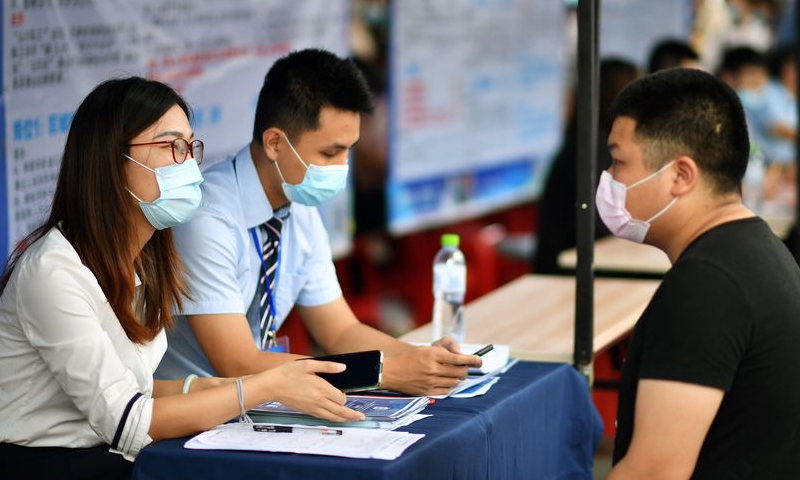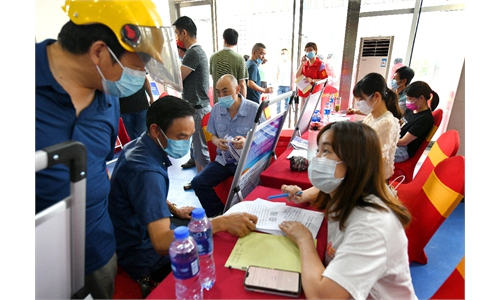Educational discrimination and epidemic impact the employment of vocational education graduates: experts

An employer (L) communicates with a job seeker at a job fair in Haikou, south China's Hainan Province. File Photo: Xinhua
A recent survey on employment conditions of China's vocational education graduates released by a job hunting agency shows that their salary level and employment expectations are much lower than those of undergraduates from key universities. Experts point out that educational discrimination and the epidemic have affected the job market for vocational education graduates in recent years, and that more jobs should be offered to those with specialized skills.
The report released by major recruitment website 51job.com on Tuesday shows that 63.8 percent of the surveyed vocational education graduates expect to earn 5,001-8,000 yuan ($715 - 1,144), but only 29.3 percent of the respondents who have obtained a job offer actually earn the amount within this range, 63.4 percent actually earn less than 5,000 yuan and less than 5 percent of the surveyed earn more than 10,000 yuan a month.
The "Report on the Demand and Job Search Status of Graduates from Key Universities in China 2021" released by the agency shows that there is a close correlation between education and salary, with most undergraduates from key universities expected to earn a monthly salary of 8,001-10,000 yuan, and 43.0 percent of the undergraduates who received a job offer were paid at this level. The vast majority of employers offer graduates with a master's degree a monthly salary of over 10,000 yuan.
After graduation, more than 30 percent of the respondents will "pursue further education and graduate from universities." 80 percent of them make this choice out of the consideration that "the higher the education is, the easier it is to find a good job."
Many of the respondents believe their degree is not enough to earn them a post at enterprises.
Education experts have also pointed out the plight of vocational education graduates when seeking jobs in recent years, especially in light of widespread academic anxiety and a prolonged epidemic.
"In previous years, the employment rate of vocational education graduates was higher, although the quality could be improved," Chu Zhaohui, a research fellow at the National Institute of Education Sciences, told the Global Times, pointing out that the employment environment has been getting more difficult for them.
Among vocational education graduates, the higher-end professionals are squeezing the employment prospect of lower-end professionals, and employment expectations will also follow the downward pressure, he said. Hence, more vocational education graduates are now applying for college entrance.
Chu pointed out there are now about 10 million college graduates every year, but in fact statistics show that senior positions require more than 30 million talents, which means that there is a vast employment space for vocational education graduates.
"In addition, many university graduates only have general abilities, but not the ability to specialize in a particular industry or position, which highlights the advantages of vocational education graduates in the job market."
"Ideally, if your personality is sound and you've learned the skills society needs, then you should be able to find a proper job," Chu said. "But that's not the case, our current social evaluation is not sound, and many companies prefer to hire people with a high educational background rather than focus on their ability."
More jobs should be open to vocational education graduates with professional abilities, but it will take some time and effort to eliminate educational discrimination in our society, he noted.
Huang Ziting also contributed to the story

